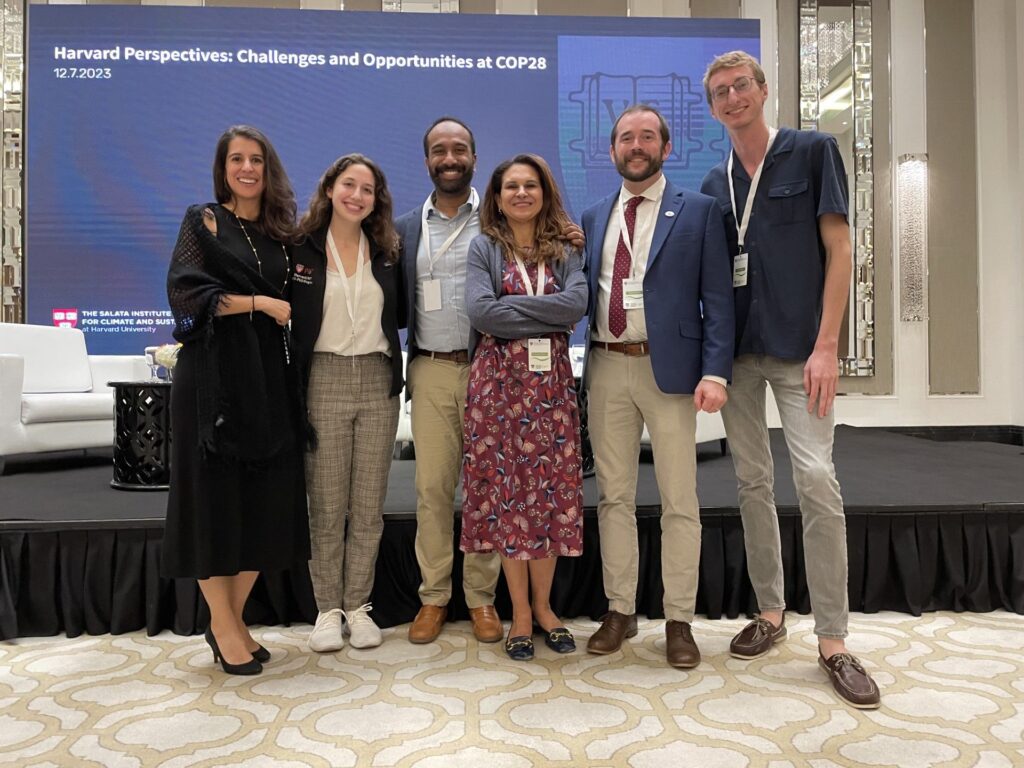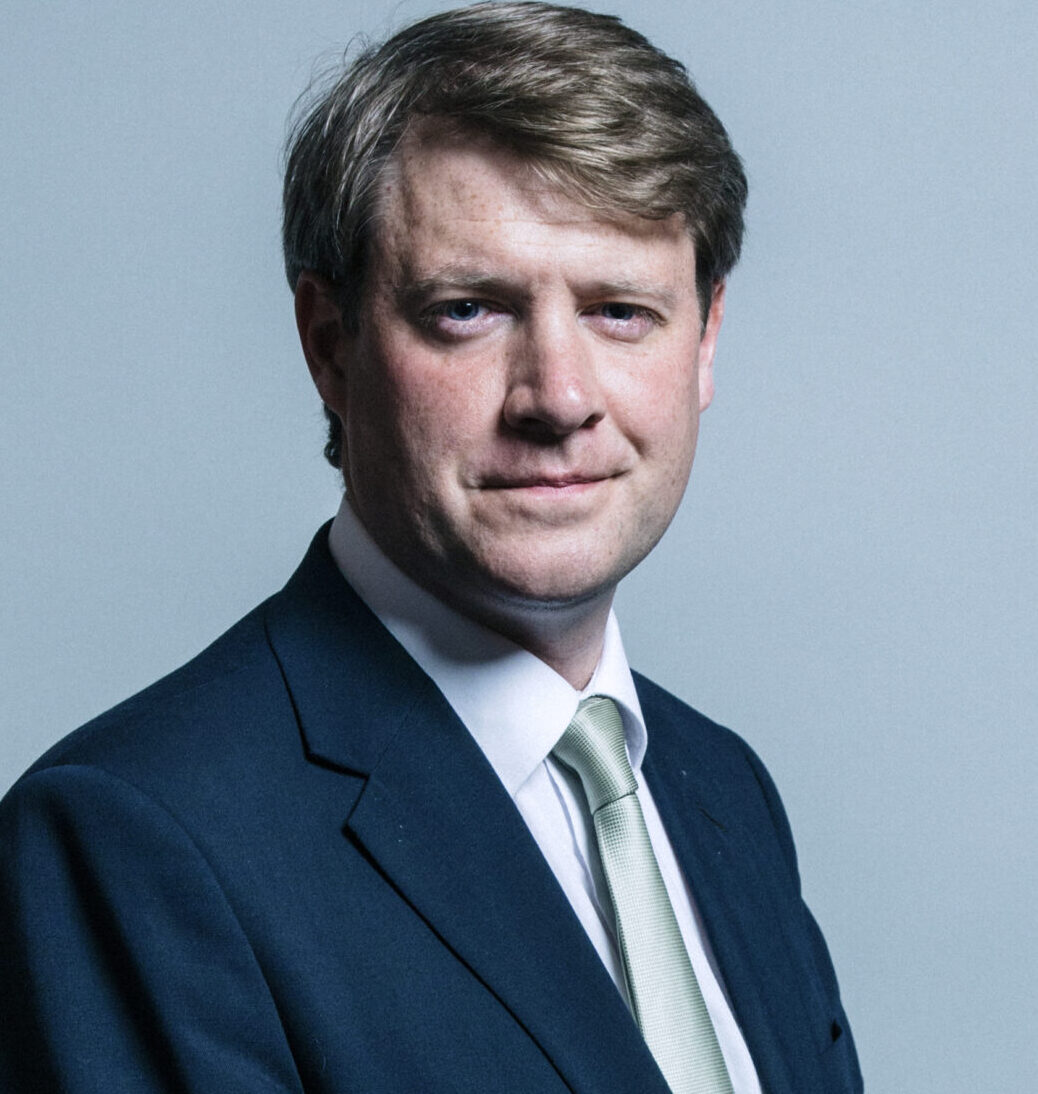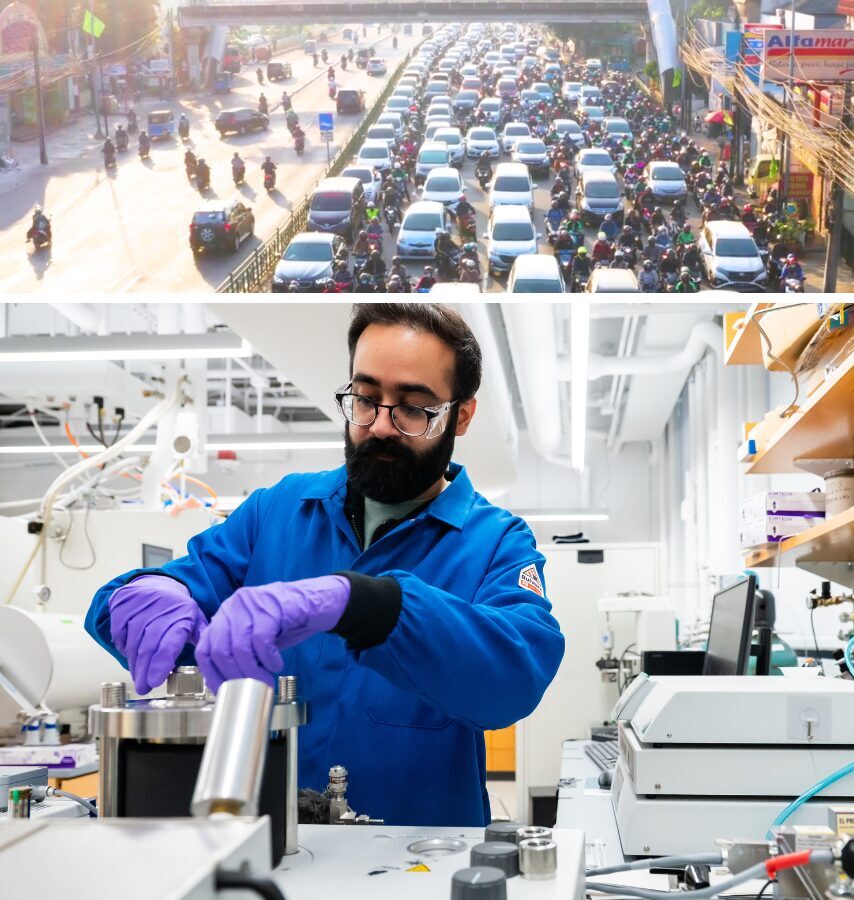Harvard delegates reflect on COP28
Harvard’s delegation to the COP28 climate change talks in Dubai this month included over a dozen faculty representing six Harvard Schools and the wide range of disciplines required to tackle the climate crisis, from public health to economics.
Early on December 13, the parties reached what has been hailed as a historic agreement, calling on all countries to contribute to “transitioning away from fossil fuels in energy systems, in a just, orderly and equitable manner.” Though the UAE Consensus did not include language to “phase out” oil and gas, as many climate advocates had hoped, it is the first time a COP declaration has specifically targeted fossil fuels. The Dubai meeting also ended with an appeal to triple renewable energy capacity and combat methane emissions, a goal to halt deforestation by 2030, and an outline for a loss and damage fund.
The final text, while consequential, is non-binding – and one of many important outcomes of the largest COP to date. Here, Harvard faculty delegates in attendance this year share their impressions, concerns, and takeaways.

METHANE:
Robert Stavins, principal investigator of the Salata Institute’s Reducing Global Methane Emissions research cluster and head of the Harvard Project on Climate Agreements, has attended COP annually now for 17 years.
What, for you, will be the most important outcome of COP28?
I don’t think the most important outcome is the closing statement, which is no more than a nonbinding resolution about aspirations regarding the future of fossil fuels. This will likely get the lion’s share of press attention, because the press likes to characterize COPs as either “successes” or “failures,” and the closing statement provides a convenient focal point. The reality is that most COPs are neither successes nor failures, any more than it would make sense to characterize the annual World Economic Forum meetings in Davos as successes or failures. Both are very much bottom-up processes. At COP, the Parties, the 195 countries, bring their predisposed domestic priorities and perceptions of acceptable international cooperation. COP is the aggregation of those.
One thing that was striking at COP28 was the degree to which methane received increased attention, not necessarily in the negotiations, but in the plethora of side agreements forged and publicized among governments and – more importantly – among diverse members of civil society, including business associations and NGOs. This was a dramatic increase in attention since COP27, just one year ago. And our Harvard delegation was a major contributor to this, with the Salata Institute’s Initiative on Global Methane Emissions Reduction, which I have the privilege and pleasure of directing. We held two dozen meetings on our methane work (including with Professor Daniel Jacob) with governments, NGOs, and private industry; and I made four presentations in various side events over two days, including our Harvard side event.
What are some takeaways that will influence your work going forward?
Participating confirmed for me what I already thought, namely that U.S.-China cooperation in these international forums is essential for meaningful progress. So the Sunnylands Statement [jointly signed by Washington and Beijing in November] was tremendously important.
Daniel Jacob, an atmospheric chemist, is a global expert on methane emissions and the use of satellite observations to quantify these emissions. Along with several other members of faculty, he spoke about methane at a side event co-organized by the Salata Institute.
What, for you, is the most important outcome of COP28?
The incredible level of interest, urgency, and ideas in taking action on methane.
What are some takeaways that will influence your work going forward?
I was impressed by the strong interest in the tools that I develop to give stakeholders access to analyses of satellite data and inferring methane emissions. That motivates me to further emphasize the development of these tools.
PRIVATE SECTOR ACTION:
Peter Tufano, Baker Foundation Professor at Harvard Business School and Senior Advisor to the Salata Institute for Climate and Sustainability, met at COP28 with business leaders, investors, government officials, lawyers, entrepreneurs, scientists, academics, civil society leaders, and UN staff. He shared these observations:
While I didn’t meet anyone in Dubai who seemed naively optimistic, the slice of the business community I met was surprisingly positive. I heard that: The Biden administration’s climate law is motivating considerable activity; start-ups are designing remarkable innovations; in fits and starts, net zero promises are becoming transition plans; and in developed countries “capital is not a problem.”
Yet this positive message stands in stark contrast to three sets of facts on display at COP. First, businesses are far off track. MSCI’s most recent implied temperature rise data suggest that current emissions put us on track for a world that is 2.5 degrees warmer, well above the 1.5 degree Celsius goal set in Paris. Second, most “net zero” analyses assume that nature will continue to be a major carbon sink and won’t hit any tipping points, which scientists believe to be heroic assumptions. Third, work by Edelman shows that the majority of people across the world distrust business to do the right thing about climate.
The fossil fuel sector’s foot dragging, recent mergers, and apparent battle against the language of “phase-downs/outs” confirm this wisdom of the crowd. Time is running short, we have much to do, and we must move beyond narrow self-interest.
HEALTH

Gaurab Basu, Director of Education and Policy at the Center for Climate, Health, and the Global Environment at Harvard T.H. Chan School of Public Health (Harvard Chan C-CHANGE).
What, for you, is the most important outcome of COP28?
The first-ever “Health Day” was inaugurated at COP28. This was a day dedicated to highlighting the harms of climate change, ecological degradation, and air pollution on global health equity. Health professionals from across the world spoke powerfully of the harmful health impacts of a warming planet on their communities, and offered climate solutions that will protect health and save lives. Over 120 countries signed the COP28 Declaration on Climate and Health. Important commitments were made to curb greenhouse gas emissions and triple renewable energy by 2030.
What do you wish had been different?
The planet has already warmed by 1.2 degrees Celsius, and we are at a moment where pledges are no longer enough. The global community must come together and provide in great detail a binding roadmap to fully phase out fossil fuels in an ambitious and coordinated way by 2050. There remains significant pushback on providing such a roadmap, and the influences of the fossil fuel industry loomed over the proceedings. Not only do we need to ramp up clean energy capacity, but we must also aggressively ramp down the use of fossil fuels to protect health.
What are some takeaways that will influence your work going forward?
As a doctor, I know the outcomes of climate policy have powerful impacts on my patients’ health. Climate solutions protect food security, water supply, prevent heat related illness and the spread of infectious diseases. They mitigate the impacts of the extreme weather that causes migration and social instability. It’s critical for the voice of health professionals to be present and impactful in decision-making spaces. I am motivated to work hard to support the capacity building of health professionals advocating for climate solutions and to translate the health benefits of climate solutions to the public.
Francesca Dominici is Professor of Biostatistics at Harvard T.H. Chan School of Public Health and Director of the Harvard Data Science Initiative.
What, for you, is the most important outcome of COP28?
My team published a study in Science a week before COP opened that showed, for the first time, that fine particulate matter from coal-fired power plants is twice more dangerous than PM2.5 from other sources. At the Health Day Opening Session on December 3, U.S. Special Presidential Envoy for Climate John Kerry mentioned our study and made a strong argument that the climate crisis is a health crisis. We must stop measuring progress in the climate crisis in terms of degrees averted, he said, and instead by lives saved. This was one of the most satisfying moments of my research career.
What do you wish had been different?
I tend to be impatient, and I wish progress were faster. People are dying now.
What are some takeaways that will influence your work going forward?
I am so pleased to finally see that the health impacts of climate change are becoming front and center in negotiations. I am also energized by the fact that technology and data science play an essential role in combating the climate crisis. We now have data and data science tools, such as machine learning and AI, that can allow us to address questions regarding health impacts, mitigation, adaptation, measuring the carbon footprint of different sectors, and climate financing. However, there is still so much work to do, and I am energized to lead these new areas of research.
Elizabeth Willetts, the Planetary Health Policy Director at the Harvard T.H. Chan School of Public Health, led Harvard’s health delegation to COP28.
What, for you, is the most important outcome of COP28?
In the health community this was a movement-building COP. We can feel pessimistic about limited progress on meaningful agreement to strengthen mitigation, but it is worth being optimistic that COP28 was a watershed moment for engaging the health sector as a stakeholder group in climate negotiations. After several years of organic organizing, hundreds of health professionals from around the world joined together in Dubai to track and advocate within the negotiation process.
What do you wish had been different?
Food systems are essential to public health and are critical tools to addressing mitigation, adaptation, and loss and damage. While a significant element of the health conversation on climate change relates to food systems, advancements on food policy under the United Nations Framework Convention on Climate Change are woefully inadequate and at COP28 reached a standstill. We need more investment, and more attention from the health community, on food policy under the UNFCCC. One way we can start is to converge conversations on “health” and those on “food” and “water” – currently distinct siloes.
What are some takeaways that will influence your work going forward?
Having participated in UNFCCC and other UN environment negotiations since 2007, I see a clear shift in how the health narrative of climate change is underscored by a palpable urgency for real progress in global collective action. This makes sense because health professionals have responsibilities to mind the health of our populations – and this is increasingly out of our grasp, with environmental determinants playing a large role. Going forward, the network of climate-environment-health professionals will continue to grow, which is motivating because it means we can keep expanding the scope of research, dialogue, funding, and education.







